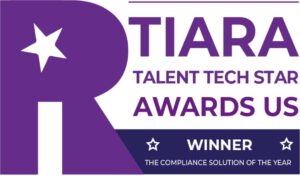Technological advancements are changing not just how we live but also how we work. According to data, in 2020, 64% of corporations were using mobile HR solutions. Six years ago, the data pointed to only 14%.
The rise in technology within HR teams and departments has been significantly triggered by a need to deal with the challenges facing human capital. These include talent compliance, retention, employee engagement, developing organizational leaders for the future, and competitive compensation.
Today, technology is transforming the HR landscape through the cloud, analytics, virtual and augmented reality, and machine learning.
Here’s what you need to know about HR technologies and some of the technologies your organization should be at the forefront of adopting.
What is an HR Technology Solution?
HR technology solutions include digital platforms, software, cloud-based technologies, and tools that store data securely, provide analytics for strategic decision-making, and automate day-to-day processes.
Digital HR platforms help manage critical HR functions such as benefits, wages, adaptation, recruitment, employee communication, compliance, and productivity management.
Automating HR processes saves your organization time and money. It also reduces costly human error.
HR technologies are vital for a business’s success. Research shows that organizations that are more open to using HR software outperform those that are not.
Where is HR Tech Applied?
HR tech has several applications within a business, often being used to expand the role of HR and align it towards employee engagement and productivity. Here’re the top applications of current and emerging HR technologies.
Smart Recruitment
HR technologies using artificial intelligence (AI) are playing a significant role in finding and hiring top talent. For instance, AI in HR software is used to understand an employee’s skill set and cultural fit through video interviews. Other pieces of software use AI-gamified assessments for candidate screening.
Employee Engagement
HR teams predominantly use Voice of the Employee (VoE) technology to monitor employee engagement. This tool uses employment engagement surveys to help figure out staff issues and gain insight into employee satisfaction.
With the data gathered using VoE, HR teams can take more informed approaches and avoid unnecessary attrition in the workforce.
Automating Repetitive Tasks
Machine learning (ML) and AI are emerging technologies actively being used within HR teams to automate repetitive tasks so that the teams can focus on other strategic tasks, such as finding and engaging top talent.
Some of the repetitive tasks that HR tech automates include compliance processes, data collection, and employee onboarding.
HR Virtual Assistants
There’s an increasing adoption of HR chatbots within organizations. Also known as HR virtual assistants, they’re being used as a virtual HR help desk where employees can get answers to routine queries.
With improvements in AI, it’s expected that a broader range of HR functions, such as generating insights on talent metrics, employee engagement, and process workflow management, will be handled by AI-powered virtual assistants.
Employee Development
Despite being a newer part of HR, the learning and development industry is expected to grow at a CAGR of 2-3% between 2020 and 2025, reaching a value of $402.1 billion. More companies are using AI-based coaching tools to recommend customized learning solutions based on an employee’s strengths, goals, and weaknesses.
Organizations can use such tools to offer every employee the right tools for development. Moreover, you can save on costs for training that the employee will never use.
The Top HR Technology Trends in 2023
The following are some of the most anticipated HR technology trends for 2023 and the near future.
Artificial Intelligence and Machine Learning
According to a study, artificial intelligence and machine learning lead as the most disruptive technology in 2023, followed closely by cloud computing and 5G.
AI and ML are expected to reduce the workload of HR teams and improve businesses’ overall productivity.
AI can process and make sense of large amounts of data within seconds. It also offers more trusted insights since it represents information without bias.
HR departments will increasingly adopt AI tools for various purposes such as recruitment, maintaining compliance, tracking metrics, and onboarding and training.
Blockchain
According to a study, blockchain is another technology expected to transform HR departments. Blockchain offers improved security through network encryption, allowing employees, HR teams, and management to securely share and verify employee data.
Blockchain technology will help HR departments achieve the following:
- Standardization – Blockchain enhances collaboration between talent departments and improves the quality of HR systems.
- Security – Blockchain gives HR teams better security for managing large amounts of confidential employee and company data.
- Trust – Blockchain uses key-based access that prevents unauthorized access to data. Therefore, the system is more trusted by internal and external parties.
Cloud
Unlike traditional HR technologies, newer, cloud-based solutions offer better integration and data access, allowing HR teams, management, and employees to collaborate better.
With cloud-based HR software, you can access everything, anywhere, anytime. HR teams can get a more in-depth view of employee engagement and performance and easily identify trends and opportunities they can leverage within their operations.
Cloud-based solutions are also growing in demand with the rise of remote working models where HR departments manage a global workforce via various networks.
According to research, HR teams using cloud-based solutions are more likely to experience gains in productivity, better workforce insights, and improved employee experience.
Analytics
HR tech systems generate a lot of valuable data. There’s an increase in the adoption of analytics systems that can tap into the data and generate useful insights on various HR processes, their bottlenecks, and their effectiveness.
These analytics tools can also be used as a basis for effective decision-making.
Virtual and Augmented Reality
Virtual and augmented reality has predominantly existed in the consumer market. However, it’s making strides within HR departments, serving as an excellent corporate training tool.
Companies such as Microsoft and Meta envision using VR and AR for corporate meetings and other business processes. Through tech-assisted corporate training, AR and VR can be used for tasks such as basic onboarding, on-the-job learning, and skill building.
HR Compliance Technology
HR compliance is crucial to every organization. Instead of relying on manual processes, more organizations are adopting HR compliance software that automatically keeps them up to date with all HR business compliance laws and regulations.
Such businesses are finding it easier to understand ever-changing and complex local, state, and federal compliance rules and legislations and avoid hefty fines.
Invest in the Right Tech
If you want to stay ahead of the game in HR, investing in the right technology is essential. With HR technologies becoming increasingly complex, powerful, and useful, it’s crucial for organizations to embrace them.
This is where VirgilHR comes in as the best HR technology to invest in. By investing in VirgilHR, you can stay ahead of the curve by easily staying compliant with accessible legal information and guidance, eliminating the need to conduct research, and enabling you to focus on what matters most: your employees and your business.
Sign up for a free demo of VirgilHR’s product today and see for yourself how it can revolutionize the way you manage HR.






